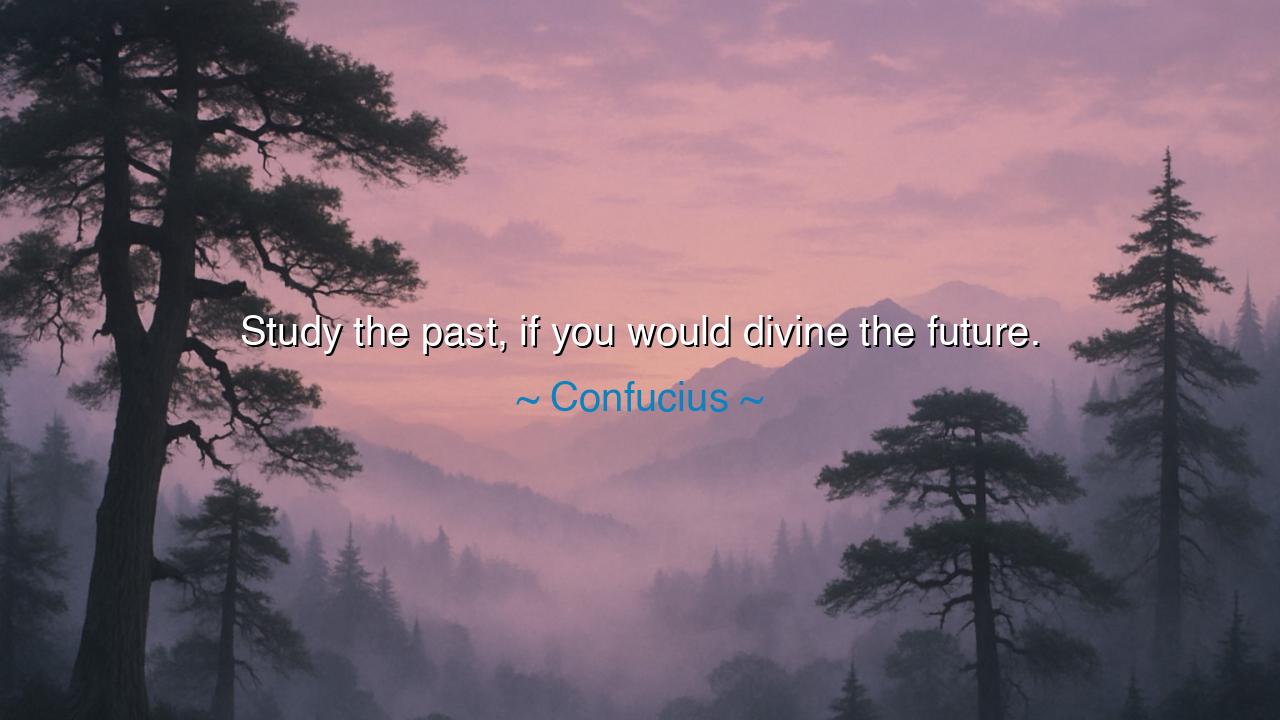
Study the past, if you would divine the future.






"Study the past, if you would divine the future." These words, spoken by the wise Confucius, are a profound invitation to reflect upon the lessons of history, to understand that the patterns of the past are not mere echoes, but the very keys to the future. In this statement, Confucius reveals an enduring truth—that the future is not an isolated event, but a continuation of the forces and actions that have shaped the world before us. To understand what lies ahead, we must first look backward, to the cycles of human behavior, to the patterns of history, and to the wisdom of those who have come before us. The future, Confucius teaches, is not a random unfolding, but a reflection of the actions and choices of the past.
In the ancient world, the great thinkers and philosophers understood the vital importance of learning from the past. The Greeks, particularly Plato, taught that knowledge of the past was essential to building wisdom for the future. Plato believed that by examining the mistakes and triumphs of previous generations, one could gain insight into the challenges and opportunities of the present. History, to the ancients, was not a dusty relic to be ignored, but a living guide—a source of wisdom for shaping the future. This is the essence of Confucius’s wisdom: the past is not a place we leave behind, but a foundation upon which the future is built.
Consider the story of Julius Caesar, whose rise to power was deeply informed by the study of Roman history. Caesar was a man of great intellect, and he did not simply rely on his military prowess, but on his knowledge of the Roman Republic’s history, its triumphs, and its failures. By understanding the past struggles of Rome, its political systems, and the mistakes that led to its previous downfalls, Caesar was able to shape his own path, ultimately transforming Rome into the Roman Empire. Caesar studied the past, not to recreate it, but to guide his actions and to avoid the mistakes of those who had come before him. In his understanding of history, he found the wisdom to shape the future.
Likewise, Mahatma Gandhi understood that the struggles of India’s past were essential to the fight for independence. Gandhi looked to the history of colonialism, the oppressions of past generations, and the teachings of great leaders like King Ashoka, whose principle of ahimsa (nonviolence) guided India toward its future of freedom. Gandhi’s success in leading India was not simply a matter of chance; it was the result of a deep understanding of the struggles and wisdom that had accumulated over centuries. He knew that the future of his nation could not be defined by the present alone, but by the lessons of the past that had shaped the path toward freedom.
Confucius’s teachings are as relevant today as they were in his time. In our own lives, we often face uncertainty and fear about the future, but Confucius teaches us that the path ahead is not shrouded in mystery; it is shaped by the choices and actions we make today, based on the understanding of where we have come from. When we study the past—our own personal histories, the stories of our families, and the history of the world—we can gain a deeper understanding of the patterns of human behavior, of the mistakes we must avoid, and the values we must uphold to create a better future. The future is not a blank slate, but a canvas upon which the lessons of the past are painted.
The lesson Confucius imparts is both simple and profound: to divine the future, we must first study the past. History is not a collection of old stories, but a living, breathing guide that can illuminate the present and shape the future. By learning from the actions of our ancestors, the great triumphs and the painful failures, we can avoid repeating their mistakes and embrace the wisdom they left behind. Only by understanding where we have been can we see clearly where we are going.
In your own life, I encourage you to look to the past—not as a burden, but as a source of strength and guidance. Reflect on the choices you have made, the lessons you have learned, and the experiences that have shaped your life. Let the wisdom of the past guide your actions in the present and give you the clarity to shape the future. Study the history of the world, the lives of the great figures, and the journeys of those who have come before you. In their triumphs and failures, you will find the wisdom to build a future that is rich in meaning and purpose. The past is not gone—it is alive in you, and it will illuminate your path forward.






AAdministratorAdministrator
Welcome, honored guests. Please leave a comment, we will respond soon